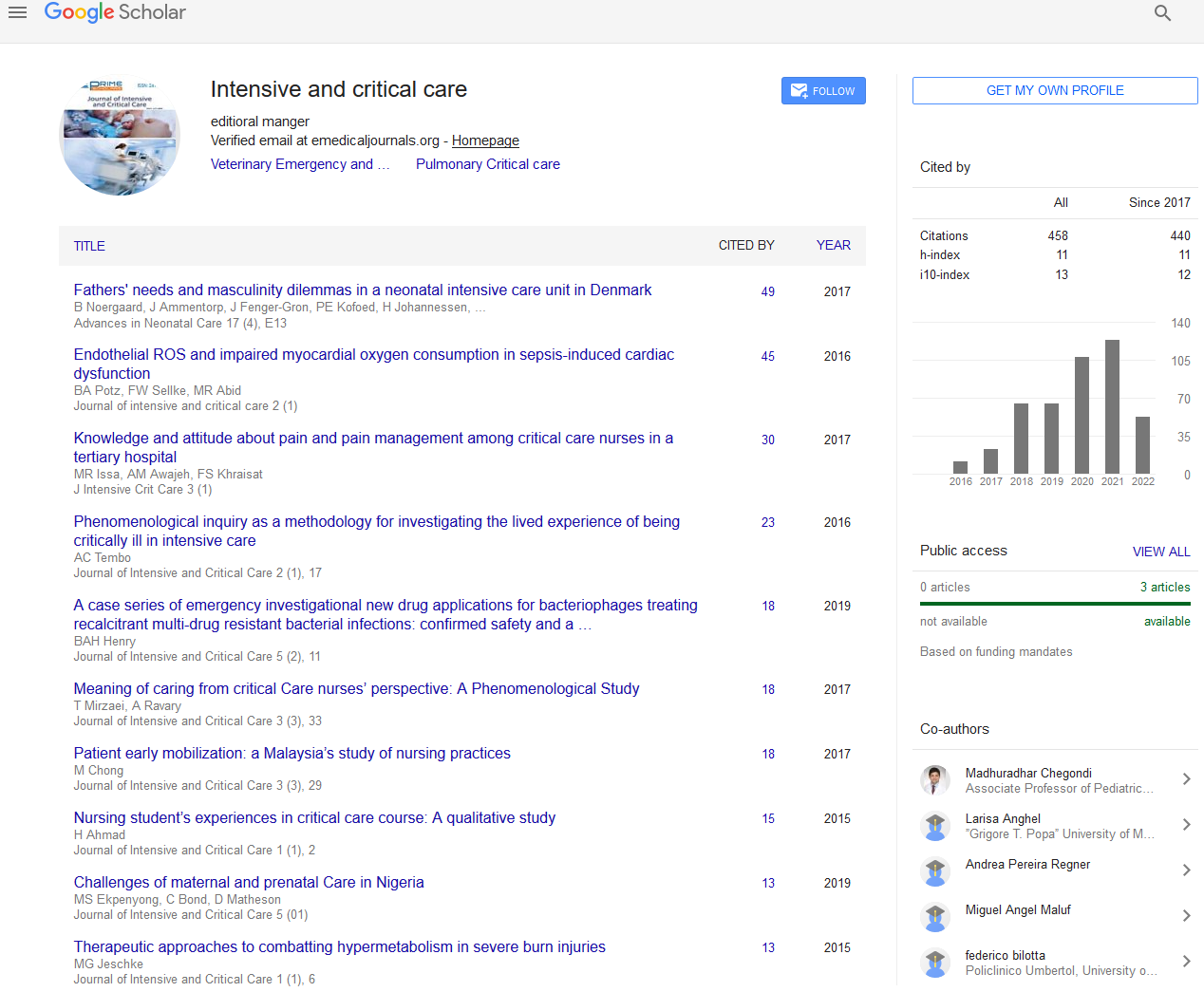Commentary - (2023) Volume 9, Issue 5
Examinations into the Effect of Nursing Unit Format on Basic Care Medical Caretakers
Amare Belete Getahun*
Department of Anesthesia, University of Gondar, Ethiopia
*Correspondence:
Amare Belete Getahun,
Department of Anesthesia, University of Gondar,
Ethiopia,
Email:
Received: 02-Oct-2023, Manuscript No. IPJICC-23-18288;
Editor assigned: 04-Oct-2023, Pre QC No. IPJICC-23-18288 (PQ);
Reviewed: 18-Oct-2023, QC No. IPJICC-23-18288;
Revised: 23-Oct-2023, Manuscript No. IPJICC-23-18288 (R);
Published:
30-Oct-2023, DOI: 10.35248/2471-8505-9.5.44
Description
Critical care nursing is an indispensable and dynamic specialty
within the broader field of nursing. It plays a pivotal role in the
healthcare system by providing life-saving care to patients who
are seriously ill or injured. Critical care nurses are well-trained,
highly skilled professionals who work in Intensive Care Units
(ICUs), emergency rooms, and other high-acuity healthcare
settings. In this article, we will explore the numerous benefits
of critical care nursing and how these dedicated professionals
contribute to improved patient outcomes, enhanced healthcare
quality, and the well-being of society as a whole. Critical
care nurses are trained to manage patients with complex,
life-threatening conditions. Their advanced knowledge and
skills in areas such as advanced life support, mechanical ventilation,
and hemodynamic monitoring allow them to provide
the highest level of care to patients who require close monitoring
and immediate intervention. This expertise is crucial for
saving lives in critical situations. In critical care, every second
counts. Critical care nurses are trained to respond rapidly to
changes in a patient’s condition. They are adept at assessing
vital signs, recognizing signs of deterioration, and initiating appropriate
interventions to stabilize the patient. Their ability to
handle medical emergencies with precision is a vital component
of patient care in critical situations. Critical care nurses
serve as advocates for their patients and their families during
times of immense stress and uncertainty. They communicate
with families, providing them with updates on the patient’s
condition, explaining treatment plans, and offering emotional
support. This compassionate aspect of their care not only benefits
patients but also helps ease the emotional burden on families,
fostering a more positive patient experience. Critical care
units are complex environments where patients often require
care from various specialists. Critical care nurses collaborate
closely with physicians, respiratory therapists, pharmacists,
and other healthcare professionals to ensure seamless care
delivery. Their role as a bridge between these disciplines facilitates
effective communication and enhances patient care. Critical
care nurses are dedicated to preventing complications that
can arise from immobility and prolonged hospitalization. They
implement evidence-based practices such as turning and repositioning
patients, administering medications, and managing
ventilators to reduce the risk of complications. By providing expert
care and education, they contribute to a patient’s smoother
recovery process. Education is a cornerstone of critical care
nursing. Nurses explain medical conditions, treatment options,
and post-discharge care to patients and their families. This not
only empowers patients to participate in their own recovery
but also contributes to better health outcomes and long-term
wellness. Critical care nurses are actively involved in research
and evidence-based practice. They continually update their
knowledge and skills to provide the most current and effective
care. Their contributions to research have a broader impact on
the field of healthcare and drive innovations that improve patient
outcomes. By providing comprehensive care to critically ill
patients, critical care nurses help reduce the length of hospital
stays and the risk of readmissions. This, in turn, alleviates the
financial burden on the healthcare system and enhances the
overall efficiency of care delivery. Working in a high-stress and
dynamic environment challenges critical care nurses to continuously
improve their skills and resilience.
Acknowledgement
None.
Conflict Of Interest
The authors declare no conflict of interest.
Citation: Getahun AB (2023) Examinations into the Effect of Nursing Unit Format on Basic Care Medical Caretakers. J Intensive Crit Care. 9:44.
Copyright: © 2023 Getahun AB. This is an open-access article distributed under the terms of the Creative Commons Attribution License, which permits unrestricted use, distribution, and reproduction in any medium, provided the original author and source are credited.

